- Home
- Muriel Jensen
Love Me Forever Page 2
Love Me Forever Read online
Page 2
Something died in her eyes at his reminder that she’d made a major, painful mistake. He felt almost guilty about that. She sighed, then cleared her throat. “Apparently.” There was a moment of loud silence before she asked stiffly, “Would you please get out of my car?”
She was finally pushing him away. This was what he wanted, what he needed. He hadn’t expected to hate it. “Sandy, you know where I stand. Eventually, things might be different, but for now...”
“If you won’t accept help, won’t take that generous gift from Nate, how do you intend to make anything different?”
He said what he knew she wouldn’t want to hear. “It’ll take time. I’ve been chipping away at the debt for a couple of years, now. It’s a slow process, but I have my self-respect.”
“Yeah. Well, I guess there’s no arguing with that.” She pushed the passenger side door open. “I have to go.”
Which was some kind of progress. But they still had to work together. “We have to find a way to be civil with each other,” he reminded her. “You’re the one who volunteered us to chair the opening of the Clothes Closet. We have to collect the clothes, plan some kind of event. There’ll be meetings, reports to Clatsop Community Action...” The Clothes Closet was a new arm of the Food Bank, being set up to provide warm winter clothing free of charge for those in need, and at a drastically reduced price to other shoppers.
“I can be civil,” she said. “Just don’t ask me to be friends.”
He opened his door, too. “Of course not,” he said before he climbed out. “That would require tolerance and respect for the other party’s opinion.”
The moment he got to his feet, she was there to push him out of her way and slip in behind the wheel. The wind whipped up from the river and a light rain began to fall. The atmosphere was perfect for the swan song of a love gone wrong. Or, less dramatically, for a love that couldn’t be. At least for now.
She yanked the door closed and he pulled his hand away just in time. He stepped back before she could run over his toes. She drove away in a squeal of tires.
* * *
HUNTER STUDIED THE new client in the chair facing his desk. He guessed the man was in his early sixties, and probably financially comfortable. When Hunter took the man’s raincoat, he noticed the exclusive label. He looked strong and fit and had lively brown eyes and white close-cropped hair.
Studying the business card the man had given him, he read the name—Harris Connolly. There was a Fairhaven, Massachusetts, address and a cell phone number, but no business name, no lofty title, no email address.
“I came through Astoria on a cruise ship a few years ago,” Connolly explained to Hunter as he leaned back in the chair and crossed his ankles. “I loved it here. I fell on the ship and broke my leg.” He grinned. “My own stupid fault. Nothing I could sue over, unfortunately. The ship had to go on without me, but the hospital took excellent care of me and arranged to get me a flight to Boston. They even found someone to drive me to the airport in Portland. I couldn’t believe how kind everyone was to me. I owe this town.”
“It’s a great place. We take good care of everyone, tourists included. So, you’re back to stay?”
“Maybe. I’m not sure.” Connolly had a warm, wide smile, but used it only briefly. He focused seriously on Hunter’s face. “I’ve scraped by for years running a little coffee shop in Fairhaven. Then I developed a new style of whoopie pie. Are you familiar with whoopie pies?”
Hunter laughed. “Whoopie cushions, yes. Whoopie pies, no. Are they a dessert?”
Connolly put a hand to his heart. “Oh, yes. And New Englanders love them. The dessert is basically a cream filling between two cakey chocolate cookies. Some are chocolate coated, some are rolled in nuts, all are scrumptious. But I developed one with cherries in the cream filling, and dipped half in milk chocolate, half in white chocolate.”
“Wow.” Hunter thought of Nate’s wife, Bobbie, and her love of all things chocolate.
“I served them à la mode in the restaurant and people came from as far away as Boston to get them ‘to go.’ I started shipping them, and caught the attention of Mrs. Walters’s Whoopie Pies. A big name among connoisseurs. She finally bought my recipe for a considerable amount of money. I’d like someone to help me manage the distribution of some of that money. I’m not good with figures, and investments just confuse me. I need help.”
“We’ll be happy to help you, of course. But we have an investment counselor connected to the firm, Suzanne Corliss. You might prefer to talk to her.”
Connolly shook his head. “I want you to help me. My aim right now is to give some money to Astoria. I thought you could figure out where it would do the most good.”
Surprised, Hunter dropped the pen he held onto his yellow pad and pushed both pad and pen aside. He smiled politely. “That’s very kind of you, Mr. Connolly.” The unwritten rule was never to let a potential client go for any reason, but he couldn’t imagine how this man had found him. Any nonprofit in town would be thrilled with a contribution of any kind, but surely someone in the mayor’s office would be more qualified to decide which groups that might be.
Connolly’s quick smile came and went again. “You’re wondering why I’m here and not at the Community Action office.”
“True.”
“It’s because last weekend I met someone you know and we got to talking; Clarissa somebody. I explained that I was searching for someone who knew about the various nonprofit agencies in town, and she said that you and your friends are active in community service. All that practical knowledge is just what I need to feel my money will end up in the right place.”
Hunter nodded. “Clarissa Burke. She’s pretty generous with her time, too.”
“Also,” Connolly shrugged and said with a curiously shy lift of his shoulder, “I’d like to keep this quiet, keep my name out of it. I hate fuss. So, I expect you’d like to do a little research into who needs what and get back to me?”
“I would,” Hunter agreed. “And just so that I know what we’re talking about here and how to distribute it, can you tell me what you’d like to give?”
“Sure. I was thinking a million dollars distributed among however many agencies you suggest. And if we could work it out so that some of that money is socked away somehow to provide them with long-term funding, I’d be very happy. What do you think?”
“Ah...” Hunter was aware that his mouth hung open. He closed it and swallowed then cleared his throat to reply. “Well thought out, Mr. Connolly,” he said, his voice raspy. “I’ll do this carefully.”
Connolly stood. He leaned across the desk and shook Hunter’s hand. “It’s been a pleasure meeting you. I’ve wanted to for some time.”
In the process of getting the man’s coat, Hunter turned, surprised at that. “You have? Oh, you mean...since meeting Clarissa?”
Connolly accepted his coat and threw it over his arm. “Yes.” He smiled and pulled on a blue plaid cap, then adjusted the bill with a debonair snap. “That’s what I meant. I look forward to hearing from you.”
“Give me a week.”
“Take all the time you need. I just subleased a condo on the river. You know the the building?”
“The Columbia House?”
“That’s it. I’ve written my new landline number on the back of the card, but the cell number on the front still works. Call me when you have a plan and I’ll make an appointment.”
Hunter walked him to the front door. “It’s been a pleasure meeting you, Mr. Connolly.” He offered his hand. “You don’t run into many philanthropists these days. Everybody’s struggling to keep themselves afloat.”
“I know. But life was generous to me and this town was so kind. I have feelings for Astoria. I’d like to share.”
“That’s highly commendable.”
“Nah. The
more I give away, the less I have to worry about. Good to meet you. We’re going to do good things together.”
“Well, you’ll be doing—I’m just fact-finding.”
“That’s an important part of the process. We want to make sure the money goes where it’ll do the most good. I’ll wait for your call.”
Connolly climbed into a silver Lexus parked out front and drove off.
Hunter strode across the green-oak-furnished office and rapped on Nate’s open door. Nate glanced up from the computer. “Yeah?”
“You won’t believe this,” Hunter began as he took a client chair and told him Harris Connolly’s story and what he wanted to do for Astoria.
Nate stared then said finally, “Well, great. If Sandy’s still talking to you, you should get her to help you. She knows every group in town.”
Running a hand over his face, Hunter groaned. “Yeah, well, I don’t think that’ll work. She’s gone. I have to figure this out for myself.”
“She lives in Astoria. How can she be gone?”
“Not gone from town. Gone from my life.”
“Oh, come on. Don’t give up. We all know she has strong opinions on everything.” Nate’s expression was vaguely superior, Hunter thought, now that Nate had his love life in order. Then Nate’s voice became vague as he refocused on the computer. “You’ll fix it. She’d do anything for anybody, and you, particularly.”
Hunter stood to leave and sketched a wave in Nate’s direction. Though Hunter had done his best to discourage Sandy’s feelings, he knew Nate’s assessment was probably still true. Sandy took care of everyone.
She just had to understand that Hunter Bristol took care of himself.
CHAPTER TWO
DISAPPOINTMENT LODGED like an anvil in her chest, Sandy did what she’d always done in such situations—she got on with her life. She drove to the Maritime Museum, parked her car and walked to the railing to look out on the river. The day was chilly and gray, but she loved it when the weather was like that. Moody and intimate, the air smelling the way she imagined heaven would.
She fought to think positively about other things. She had the rest of the day off and the girls were at daycare. She could finish painting the back porch. She could make goodie bags for Addie’s fourth birthday party on Saturday; she could buy gift wrap and treat herself to lunch while she was at it.
She sighed and a strangled little sound came out with the whoosh of air. She put a hand to her chest and breathed in, letting that wood-and-river fragrance fill her up. So she couldn’t have the man she wanted. She would survive.
Her father had left without any explanation when she was fourteen, and she’d survived. Her mother had gone into a decline for a few months, and Sandy had kept them going and they had both survived. Her husband had left two months after Addie was born, unable to deal with the tyrannies of parenthood, and she’d come through again. But, every time she’d had to pull it together, she’d felt a little of her soft side erode. She’d wondered what it would be like to have a man in her life who would be there when she turned to him, who would love her forever.
Well, she thought bracingly, that wasn’t going to happen today. She inhaled another gulp of Columbia River air and wandered back to her car, considering the virtues of painting her porch against shopping and lunch out, when her cell phone rang. She didn’t want to talk to anyone, but it could be the daycare calling about the girls.
The caller ID read A. Moreno. Armando and Celia Moreno and their two little girls were her tenants, living next door to Nate and Bobbie in a little cottage Sandy had inherited from her aunt. Bobbie had rented it before she met and married Nate and moved in with him and his nephews. Because the Morenos had come upon hard times, Sandy charged them just enough rent to cover property taxes and homeowner’s insurance. They were embarrassingly grateful.
She answered the phone.
“Sandee!” Celia was breathless. “I took the leaky faucet off the top of the...the sink in the kitchen to try to...to fix it myself and water is like a fountain! I called Mando, but he doesn’t answer. They are painting the apartment house by the bridge today.” Hunter had gotten Mando a job with Affordable Painting, one of his clients.
Must be one of those days, Sandy thought. “There’s a knob under the sink, Celia,” she said. “Turn off the one under the cold water. I’ll hold on while you do that.”
Sandy heard scurrying, mutterings in Spanish, then, “I did, but it doesn’t stop!”
“It’ll take a second.”
“Oh.” She heard Celia’s sigh of relief. “Just a little fountain. It is stopped.”
“Okay. I’ll be right there with a new faucet. That one was ready to be replaced anyway.”
Celia made a commiserating sound. “I’m sorry. Bobbie says you are having a Sandy day.”
She was surprised to feel herself smile. “I am.” A pileup of disasters was a Sandy day.
After a quick trip to City Lumber, Sandy arrived at her rental house with her tool box to find pandemonium that had nothing to do with plumbing. Celia babysat for friends who couldn’t afford formal daycare, did housekeeping and baked goodies for a Mexican bodega on Marine Drive. There were three children under two in a playpen in the middle of the kitchen. They babbled along with a children’s show on television, squealing their delight at the antics of a furry puppet. Fortunately Celia’s children weren’t home yet to contribute to the melee. Her oldest daughter, Crystal, was in the second grade, and Elena, her youngest, in kindergarten.
A loud whirring sound competed with the television as Bobbie sucked up water with a Shop-vac. She waved at Sandy then turned off the machine as two women Sandy recognized as friends of Celia’s went through a cardboard box and a large leaf bag on the table. Sandy knew they didn’t speak English and simply smiled and offered a friendly greeting.
“They have brought coats from our friends,” Celia explained. “In the box, they are good. In the bag, they need sewing. For el Armario.” The three women smiled broadly at Sandy. “The Clothes Closet,” Celia translated.
“Thank you!” Sandy was thrilled. Except for a few things of her own and her girls’ that she’d put aside in a corner of her bedroom, this was the first contribution to the Clothes Closet since the idea was conceived at a Food Bank meeting a month ago. “¡Gracias!”
The women nodded and responded in Spanish.
“They are happy to help,” Celia said, “because you have helped me.”
The women left in a flurry of waves and Spanish exclamations.
“Hi.” Bobbie hauled the large drum and hoses away from the sink so that Sandy had room to work. She looked into her friend’s face, her sympathetic expression explaining that she’d read Sandy’s morning accurately.
Sandy fought with the packaging, finally won and put the new faucet aside. “I am so sorry,” Celia said, hanging over her as she cleaned the sink around the mounting.
“It’s all right, Celia. No harm done.” After putting the faucet assembly in the holes, Sandy crawled under the sink to place washers and nuts on the mounting studs and hand tightened them, then finished the job with the wrench.
“It always surprises me that you’re so strong.” Bobbie had crouched beside Celia and was watching also. “I can never make a wrench work that well.”
“There’s a hardware store in my checkered past, remember. I clerked when I was in high school.” Sandy pointed to her tool box on the floor in front of the refrigerator. “There’s another wrench on top. Would you get it for me, please?”
Bobbie retrieved the tool. “I forgot that. You fixed the john in our dorm room. But, now you’re just showing off. Two wrenches?”
Sandy took it from her. “One to hold the fitting and the other to turn the nut on the water supply line.” She did as she explained, then told Celia to turn on the cold water, then
the hot.
Bobbie looked doubtful. “You want to get out from under there first?”
“No. It’ll hold.”
Celia did as Sandy asked. There were no leaks.
Sandy crawled out from under the sink and accepted Bobbie’s hand up.
Celia wrapped her in a hug. “Thank you, Sandee. You are the best landlady in the world!” She handed her a check. “Here is the rent. Mando says we must pay you more, but we have no—”
Sandy stopped her. “Celia, we agreed on the rent. It’s fine until Mando gets a promotion or you win the lottery or something.”
Celia’s eyes teared. “I will come and clean your house.”
“No, you don’t have to do that. When my mother babysits for me, she can’t sit still, so she does it. You and Mando are fine here, Celia. You can live here at this rent until the girls get hitched.”
Celia repeated her last word uncertainly. “Hitched?”
“Casado,” Bobbie provided. “Married.” When Sandy looked at her in surprise, she said, “Crystal taught me. Last art class we drew brides, princesses and warriors.”
Crystal, Celia’s seven-year-old, was in an art class Bobbie taught at Astor Elementary School. Bobbie had learned about the Morenos’ troubles through Crystal last Christmas and told Nate, who had called the legal office Sandy worked for to see if anything could be done. Since then, they’d all been allied to make life more livable for the family.
Celia understood her meaning and hugged her again, smiling. “Until the girls are casado, si. But Mando will not let them get casado until they are thirty. You will wait a long time for more rent.”
“It’s fine, Celia.” Sandy glanced at her watch. “I’ll take the box of clothes home with me, run a few errands and be back to make sure the faucet isn’t leaking.”
Celia nodded. “Then I will send you home with frijoles refritos and flan.”
Sandy would have told her she didn’t have to, but Celia’s flan was legendary. And she put chorizo and onion in her beans.

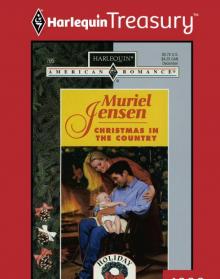 Christmas In The Country
Christmas In The Country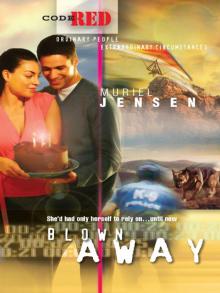 Blown Away
Blown Away In My Dreams
In My Dreams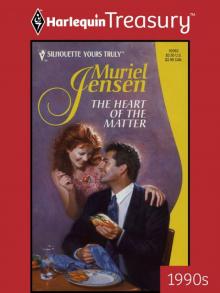 The Heart of the Matter
The Heart of the Matter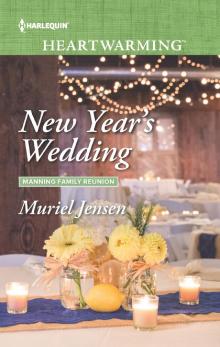 New Year's Wedding
New Year's Wedding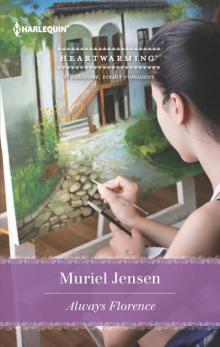 Always Florence
Always Florence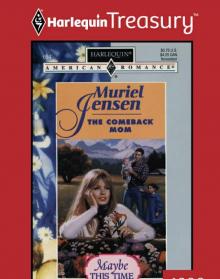 The Comeback Mom
The Comeback Mom To Love and Protect
To Love and Protect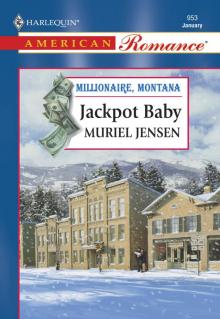 Jackpot Baby
Jackpot Baby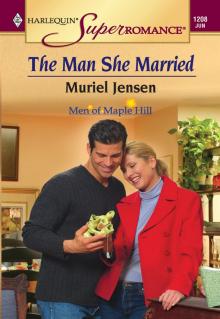 The Man She Married
The Man She Married Love Me Forever
Love Me Forever